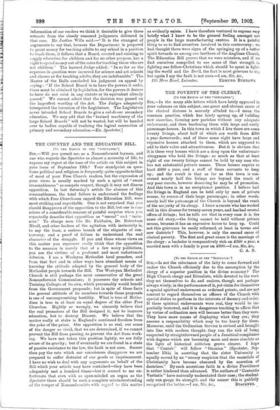THE POVERTY OF THE CLERGY.
[TO THE EDITOR OF THE "SPEOTATOR.".I SIR,—In the many able letters which have lately appeared in your columns on this subject, one great and obvious cause of the clerical distress is scarcely alluded to,—I mean the common practice, which has lately sprung up, of building new churches, forming new parishes without any adequate endowment, and then burdening them with large and costly parsonage-houses. In this town in which I live there are-some twenty livings, about half of which are worth from £300 a year downwards ; and of these some eight have large and expensive houses attached to them, which are supposed to add to their value and attractiveness. But it is obvious that it is these very houses which are a drag upon the unfortunate clergymen who hold the livings : so much so that at least eight of our twenty livings cannot be held by any man who has not substantial private means. These houses require at least 2600 a year, and a staff of three servants to keep up ; and the result is that as far as this town is con- cerned nearly half the livings are beyond the reach of any poor curate, however deserving he may be of promotion. And this town is in no exceptional position. I believe half the livings in England can be held only by men of private means, by reason of their large parsonages; in other words, nearly half the patronage of the Church is beyond the reach of the majority of its clergy. I know a curate who has worked well in this diocese for twenty-seven years, and has had several offers of livings; but he tells me that in every case it._ is the same old story,—the living cannot be• held without private means, because it has an expensive house to keep up. Could not this grievance be easily reformed, at least in towns and new districts ? This, however, is only the second cause of clerical poverty. The first and great cause is the marriage of the clergy : a bachelor is comparatively rich on esoo a year, a married man with a family is poor on 2600.-1 am, Sir,
C. A. B.






































 Previous page
Previous page